Indian Institute of Technology, Madras has launched the state-of-the-art Sudha Gopalakrishnan Brain Centre that aims at resolving major neurological disorder and other medical issues and help understand the complex functioning of human brain for the benefit of humankind in the near future.
According to the IIT Madras spokesperson, the state-of-the-art Centre aims to become a world-renowned research centre, generating unprecedented human brain data, scientific output and technology tools. The centre aims to power an ambitious Global Project to map the human brain at the cellular and connectivity levels, with a focus on high-resolution brain imaging.
The brain centre was inaugurated today on March 19, 2022 in the presence of Prof. K. Vijay Raghavan, Principal Scientific Adviser to the Government of India, Prof. V. Kamakoti, Director, IIT Madras, IIT Madras Distinguished Alumnus Kris Gopalakrishnan, Sudha Gopalakrishnan, and Prof. Mohanasankar Sivaprakasam of IIT Madras, who will be heading this Centre.
IIT Madras plans to train hundreds of undergraduate and postgraduate students at this Centre in neuroscience and computing, machine learning techniques on the cutting-edge brain data.
The brain Centre aims to power a large-scale Multi-Disciplinary effort to map Human Brains at Cellular Level. This new state-of-the-art centre aims to become a leading global centre for Human Brain Research with Transformative Impact in the fields of Science and Medicine.
The Centre is supported by Mr. Kris Gopalakrishnan and Mrs. Sudha Gopalakrishnan. Their dedicated efforts in seeding research at IIT Madras at the intersection of Neuroscience and Engineering are now powering this Centre in the frontier research area of brain mapping.
Addressing the inaugural event, Prof. K. Vijay Raghavan said, “The combination of IIT Madras, which has the expertise in science and data analysis, with medicine is going to be revolutionary. Going forward, we have an extraordinary problem in Neuroscience, i.e. on the functioning of human brain. We are at an earlier stage in our understanding of the human brain functioning. The IIT Madras brain centre will help in solving complex issues that will benefit the world.” 
Prof.Raghavan cited the example of IIT Madras Research Park, which has become a model that every institute seeks to imitate. Similarly, brain centre will evolve to that level.
The first ongoing project of the Centre titled ‘Computational and Experimental Platform for High-Resolution Terapixel Imaging of ex-vivo Human Brains’ for high-throughput light microscopic imaging of whole human brains is supported by the Office of Principal Scientific Adviser to the Government of India. Through this project, the Centre has developed a high-throughput histology pipeline that processes whole human brains into high-resolution digital images.
Using this technology platform, the Centre is imaging post-mortem human brains of different types and ages. The Centre has already acquired whole brain serial-section cell-resolution volumes of three developing brains to date. These unique first-in-class data sets that provide a high-resolution view of developing brains will be released in the near future.
Kris Gopalakrishnan, distinguished Alumnus of IIT Madras said there is a need for more support to foster world-class research in India. Scientists and engineers play an important role in feeding the knowledge economy of the country. The country has the right talent, resource and opportunity in leading some areas globally”.
Congratulating the Researchers, Prof. V. Kamakoti, Director, IIT Madras, said, “The Brain Research Centre is a great case study which proves that technology can contribute to medicine and solve societal problems. The Centre will make deep in-roads in collecting data for brain research.”
Further, Prof. Mohanasankar Sivaprakasam, Department of Electrical Engineering, IIT Madras, and Head of Sudha Gopalakrishnan Brain Centre said, “The technology platform we have developed and our strong medical collaborations, is allowing us to generate high-resolution large-format histology sections of human brains that will advance the field significantly.”
Prof. Partha Mitra, Professor, Cold Spring Harbor Laboratory and Distinguished Visiting Chair Professor, IIT Madras, said, “3D digital neuroanatomy of the post-mortem human brain with cellular resolution is a field with great potential for scientific discovery and also for the understanding of neurological disorders. The unique data sets being generated here promise to be widely impactful through open sharing with an international research community.”
This complex project was possible due to IITM’s strong collaboration with medical institutions. The clinical partners for this project are CMC Vellore led by Dr. George Varghese, National Institute of Mental Health and Neuro Sciences (NIMHANS), led by Dr. Anita Mahadevan and Saveetha Medical College and Hospital led by Dr. J. Kumutha.




